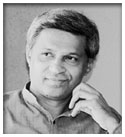 A Brief Profile A Brief Profile
Dr. Vinod Vidwans
M. Des. Ph. D. (IIT Mumbai), India
(Curriculum Vitae)
Dr. Vinod Vidwans is currently a Professor at the Flame School of Communication, Pune. He was a Senior Designer and an Ex-Vice Chairman (Research) at National Institute of Design (NID), Ahmedabad. He also headed the disciplines of New Media and Software User Interface Design at NID, Ahmedabad, India. At NID he taught Foundation, Undergraduate and Postgraduate students across all the disciplines He is also a visiting faculty at IIM Ahmedabad, IIT Kanpur, Indian Institute of Science Bangalore, D J Academy of Design Coimbatore, CEPT University Ahmedabad, and Pt. Deendayal Petroleum University Gandhinagar.
Dr. Vidwans is a cognitive philosopher, a designer and a portrait painter. He has done his Ph. D in Cognitive Philosophy and Master of Design from Indian Institute of Technology, Powai, Mumbai. He holds another Masters Degree in Fine Arts from Nagpur University where he topped. He is a recipient of Junior Research Fellowship in Fine Arts from University Grants Commission, India.
His doctoral work postulates a paradigm called `Design Intelligence’ and characterizes creativity from a holistic perspective. He carries more than twenty years of professional and research experience. While working in the industry, he designed and developed a multimedia CD ROM on computer literacy programme titled `COMPLIT’. Presently this programme is acquired by Govt. of Maharashtra (Maharashtra Knowledge Corporation Ltd.) and renamed as MS-CIT and has now more than five million users.
He has designed and developed Sharada multilingual technology for Indian languages.
He has designed and developed a creative intelligent expert system for Indian Classical Music and is about to publish a computational theory of Indian classical music. The software generates a Bandish (a musical composition) on its own without any human assistance in a given Raga and renders it in traditional classical Indian style. The creative software system uses principles of artificial intelligence (AI). He was invited to contribute a chapter in an international publication titled `Educating artists for the future’ (Ed.) Mel Alexenberg. The book was published by Intellect Books, UK in May 2008.
NCERT invited Dr. Vidwans to become a member of the curriculum development committee for Graphic Design. Under this assignment he has contributed in writing a text book on Graphic Design for Standard XI and Standard XII.
Dr. Vidwans is a dedicated Teacher, Researcher, and Designer with substantial managerial experience in the industry.
At FLAME, he conducts courses across schools in diverse disciplines. He teaches courses on creativity and innovation for entrepreneurship development at FLAME School of Business. He also teaches courses on philosophy for FLAME School of Liberal Education. His overall pedagogical approach is aimed at encouraging students to get engaged in creative thinking, critical thinking, reflective thinking, specially designed exercises for scenario building and immersive thinking. He is a strong believer in non-evaluative, non-threatening humanistic teaching-learning methods.
Dr. Vidwans is a Professor of Creativity and New Media Communication. Teaching is his chosen profession to follow a passion called Creativity. He believes; creativity is the crux of human existence and expression. Shaping up young and raw minds towards Creative-Intelligence is a challenge as well as a satisfaction. Creativity is a natural articulation and manifestation of intention. Creativity follows natural laws. One must remain loyal to these laws. The rest follows.
Brief description of his courses and pedagogy is as follows.
Creativity and Innovation for Entrepreneurship
The course encourages students to understand the process of creative thinking as well as the process of transforming creative ideas into final product or services. Process of innovation involves a step-by-step mechanism to generate creative ideas and manifest them into desired output. The course helps students to understand the journey of creative and innovative ideas from MIND TO MARKET.
This course deals with understanding:
- Major creative challenges in the industry
- Techniques of Creative and innovative thinking
- Analysis for resolving the issue(s)
- Creative solutions
- Transforming ideas into final output
Lectures, Practical exercises and Conceptual discussions are used as the major learning methods for this course to open up their minds. Specially designed exercises take students through process of ideation to develop insights into the nature of creativity and innovation. Students work individually as well as in groups on assignments.
Philosophy of Bhagavad Gita:
This course tries to look at Bhagavad Gita from philosophical perspective. It discusses all the important philosophical concepts from the original selected Sanskrit text from Bhagavad Gita. The course addresses the issues of Mind, Body, Self, God, Knowledge, Karma, Ethics, and Liberation under broad philosophical perspectives viz. Karma Yoga, Gyana Yoga, Bhakti Yoga, Ethics and their significance TODAY. At the end of the course, students share their learning experience in the form of an open jury.
Philosophy of Patanjal Yoga:
This course tries to look at the practice of Yoga from philosophical perspective. It discusses all the important philosophical concepts from the original Sanskrit text of Patanjal Yoga Sutra and then compares them with similar concepts in other schools of Indian philosophy. The course addresses the issues of Mind, Body, Self, Ethics, and Liberation in the context of Yoga sutra. At the end few sessions are devoted for introduction to meditative yogic techniques as well as the Yoga-Nidra. At the end of the course, students share their learning experience in the form of an open jury.
Dr. Vinod Vidwans, Professor, New Media and Creativity,
FLAME School of Communication, PUNE, India.
Email:
vinodvidwans@yahoo.com
vinodvidwans@gmail.com
vidwans@flame.edu.in |



 A Brief Profile
A Brief Profile